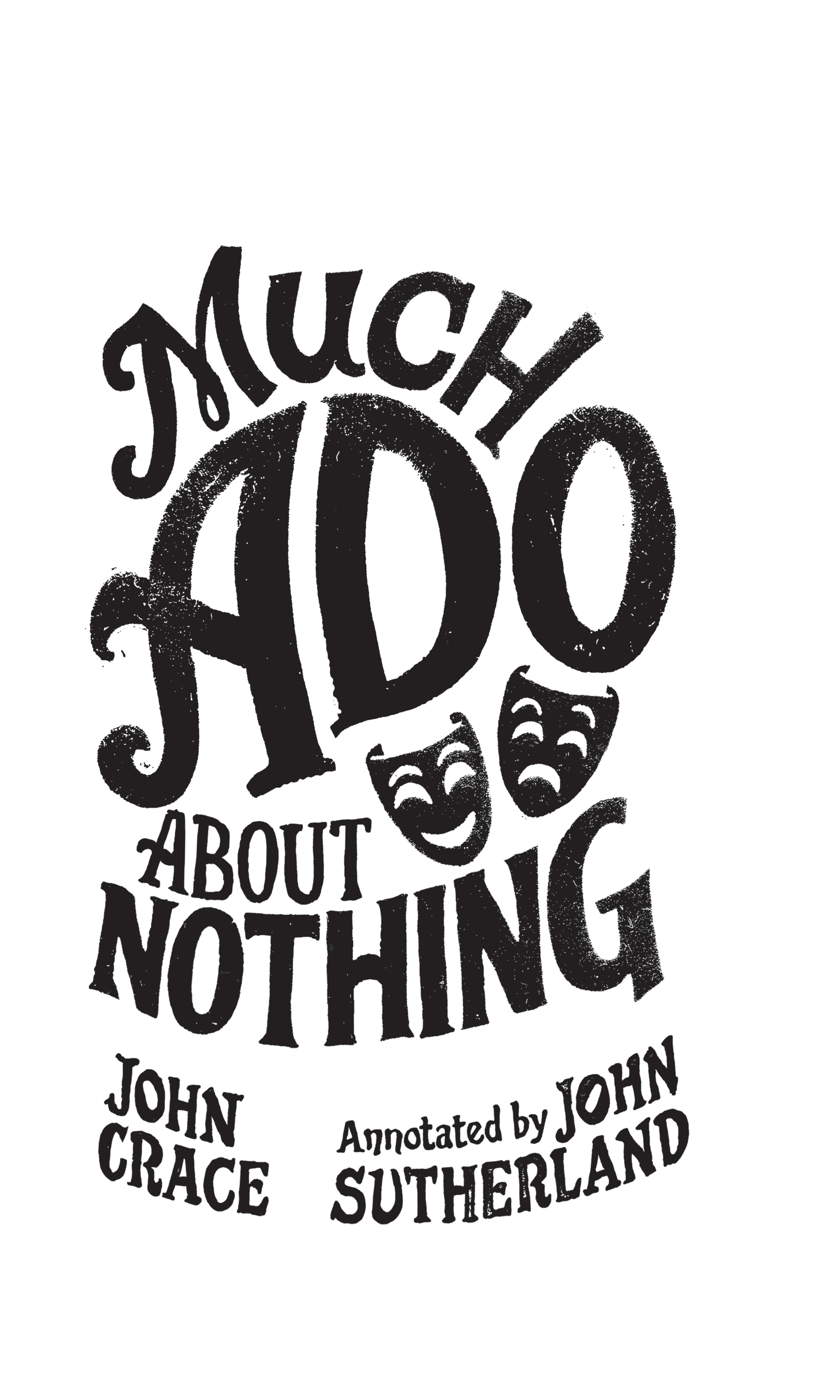




1 No one much likes the title of this play, for which Shakespeare may not have been responsible (we don’t know; no posters have survived). King Charles I spoke for all discriminating admirers when he crossed out ‘Much Ado About Nothing’ on the title page of his Folio copy and replaced it with ‘Beatrice and Benedick’.


2 Shakespeare’s theatre did not run to programmes, which is why characters use other characters’ names so profusely in the early scenes. There may have been posters and playlists placarded at the entrance to the theatre.
LEONATO governor of Messina (appointed by Spain)
BEATRICE niece of Leonato (resident in Leonato’s household the past year)
HERO daughter of Leonato
DON PEDRO prince of Arragon
BENEDICK gentleman of Padua, in the Court of Don Pedro
DON JOHN Don Pedro’s bastard brother, recently reconciled to him after a war
CLAUDIO a count of Florence, in the court of Don Pedro
ANTONIO Leonato’s brother, an old man
CONRADE associate of Don John
BORACHIO associate of Don John
BALTHASAR musician in the service of Don Pedro
MARGARET gentlewoman in Leonato’s household
URSULA gentlewoman in Leonato’s household
DOGBERRY constable of Messina
VERGES, SEACOAL watchmen, reporting to Dogberry
FRIAR FRANCIS a priest
SEXTON a cleric
3 The play’s setting is Messina, Sicily – but there is hardly a more Spanish name and title than Don Pedro of Arragon. This might cause some perplexity for those not up to speed with pre-unification Italian history (i.e. most of us). Some context is helpful. The play is set at a time (present Shakespearean day, around 1598–99) when an unspecified battle has just been won. A band of victorious military men – officer-class blue-bloods, all (casualties have, happily, been minimal) –return for some rest and recuperation (and marriage) in the ‘house’ (a palazzo) of the Sicilian Governor of Messina. At the time, Sicily was a Spanish imperial territory and the local government was delegated to trusted Sicilians. The noblemen, who are the principals in the play, are of both nations, Dons and Signors. Messina was a major cereal-exporting port –sailors knowledgeable about the place would be familiar around London’s South Bank, where the theatres and many docks were located. It’s worth remembering, too, that it’s only just over ten years since England came within a whisker’s breadth of being invaded by Spain in 1588 – horrible thought. Had they won, the Globe would have been performing plays by Lope de Vega and Calderón.
4 A league was the distance a man could walk in an hour or a horse cover in a quarter of an hour. Time was an easier measure of distance than ‘miles’ before accurate cartography (viz. a thousand steps).
5 Who’s the battle against? We never know. Leonato is not, of course, thinking entirely about casualties, but ransom –always a painful experience for the gentlemanly class. Sicily, under Spanish domination, was subject to regular uprisings and rebellions by the indigenous population. Savagely put down, often. But let’s not think of that.
LEONATO
I learn in this letter that Don Pedro of Arragon comes this night to Messina. 3
MESSENGER
Indeed, my lord, he is but three leagues hence.4
LEONATO
How many gentlemen have you lost in this battle? 5
MESSENGER
None of any note.
6 Claudio is ‘Florentine’ – from Florence. What he’s doing in Sicily, fighting for what was essentially a foreign country, is never made clear. Money, booty, may have been the reason.
7 There’s evidence that Shakespeare dashed off Much Ado in a hurry. The fact, for example, that most of it is in prose –quicker to get on the page than the iambic pentameter. This uncle of Claudio’s, whom Shakespeare obviously thought could be useful in the plot, is never mentioned again. Leonato’s wife Innogen also sinks without trace.
8 The battle between men is over; the merrier battle between the sexes has begun. Beatrice is concerned about Benedick (has he been killed, injured?) but doesn’t want to show it. So she throws in a diversionary insult – a broad hint to the alert members of the audience. Why does she care? Is there an ulterior reason? Yes, indeed there is.
9 Shakespearean bawdy ahoy! There’s a vein of civilised filth running through most of Shakespeare’s comedies. The hero is, literally, ‘well-dicked’. Only once in the play is he called ‘Benedict’ – the term common in Christian blessing. ‘Beatrice’, incidentally, means ‘the one who blesses’. The couple are, it’s hinted, made for each other.
10 In old physiology, the stomach was associated with courage, as in the phrase ‘no stomach for a fight’. We use the term ‘guts’ in the same way. ‘Trencherman’ is derogatory: Beatrice suggests that he is better at using his knife (trencher) for grub.
LEONATO
A victory is always so much sweeter when it’s only the plebs that die. I hear that Claudio acquitted himself well.6 His uncle will be pleased. 7
BEATRICE
I pray you, sir, is Signor Humpty returned from the wars? 8
MESSENGER
I’m not sure who you’re talking about.
HERO
My cousin means Signor Benedick. 9
MESSENGER
Oh yes, he’s back.
BEATRICE
How is love’s dream? Are all his loves still dreams? And how many hath he killed?
MESSENGER
He did good service, lady. He is a man stuffed with virtues.
BEATRICE
He is a valiant trencherman; he hath an excellent stomach. 10
11 Shakespeare wishes us to register the specifically Italian setting. This is not his nowhere ‘Illyria’ or vague ‘Bohemia’. The Latins – traditionally hot-blooded lovers – are as quick with a quip as a sword. They are passionate, not phlegmatic. The play opens with rapid-fire prose exchanges which alert the audience to a faster rhythm than in, say, Hamlet, with the sombre Scandinavian thud of Hamlet’s decasyllabic soliloquies.
12 In this play, ‘wit’/‘witty’ generally means ‘smart’ – sometimes downright smart-arsed. It is not ‘wisdom’. Wit could also mean ‘intelligence’. But here Beatrice’s smartness alludes, by mention of the number five, to Aristotelian psychology. The Aristotelian five wits are: common sense, imagination, fantasy, judgement and memory. The more learned in the audience would apprehend that Beatrice knows her onions. She has been well educated.
13 A joke about the dreaded syphilis – ‘Neapolitan bone ache’ –associated with southern Italy. The disease was supposedly brought to Europe from the Americas by Columbus. Certain members of the audience would be nervously scratching their groins. There are innumerable pox jokes in Elizabethan and Jacobean comedy.
14 The fact that he is a bastard – in both senses – is withheld by Shakespeare until late in the play. The bard knew how to ration information, to keep the audience on its toes.
15 Ironic. The leaders of a victorious battle would normally receive a triumphant welcome back. Don Pedro’s reception is strangely low-key. He notices. It irks him. He’s easily irked.
MESSENGER
Are you calling him fat?
LEONATO
Take no notice. My niece always goes on like this with Signor Benedick. It is a skirmish of wit between them. 11
BEATRICE
Faith that it were. In our last conflict, Benedick lost four of his five wits. 12 By now, I fear he is but half a wit. Pray tell me, who is his new best friend forever? He hath a new one every month.
MESSENGER
He spends much time with Claudio.
BEATRICE
You mean he clings to him like a rash. Pray God, Claudio has a decent supply of antibiotics. 13
MESSENGER
Don Pedro is approaching.
Enter Don Pedro, Claudio, Benedick and Don John the bastard 14
DON PEDRO
You really shouldn’t have gone to so much trouble . . . 15
16 The Sicilian governor kow-towing to his Spanish master. Political tensions are already pulling the fabric of the action.
17 I.e. Hero. The name ominously recalls an infamously suicidal lover, memorialised in Marlowe’s poem Hero and Leander, which was popular at the time.
18 Cuckoldry is hinted at.
LEONATO
It’s my pleasure to near bankrupt myself entertaining you. 16
DON PEDRO
Is this your daughter? 17
LEONATO
So my wife says . . . 18
BENEDICK
And what say you?
BEATRICE
Oh God, look who it isn’t. I was hoping you might have got yourself killed.
BENEDICK
Not you again. I can’t help it if all the ladies love me . . .
BEATRICE
All but me . . .
BENEDICK
Thank God for small mercies. For I have yet to meet a woman who can touch my heart.
BEATRICE
You’re just a commitment phobe.
19 Given Much Ado’s Italian and courtly setting, the literate members of the audience would recall Baldassare Castiglione’s The Book of the Courtier (translated into English some ten years before the play’s first performance and, like Hero and Leander, a bestseller). Shakespeare clearly drew on Castiglione in the creation of Beatrice. Women, decreed Castiglione, should in the courtly world display sprezzatura. He invented the word – it is usually translated as ‘quick vivacity’. Beatrice is sprezzatura incarnate. In an English setting, her smartness would brand her a shrew. And we know what happens to them, from The Taming of the Shrew. They end up kissing men’s boots.
BENEDICK
Me? Me, the commitment phobe? You’re the one with commitment issues.
BEATRICE
How do you work that one out? I was the one to whom you gave the ‘I’m sorry, it’s not you, it’s me’ crap last time.
BENEDICK
Jeez. I was only trying to be nice. It was you, not me, all along. I know what you’re like. You came on all sweet but I could tell you didn’t mean it.
BEATRICE
So you dumped me . . .
BENEDICK
That’s a bit harsh . . .
BEATRICE
But fair . . .
BENEDICK
I merely got the dumping in first before you dumped me. In any case, there was a war coming up . . .
BEATRICE
And thank God for that. If not for your survival. 19